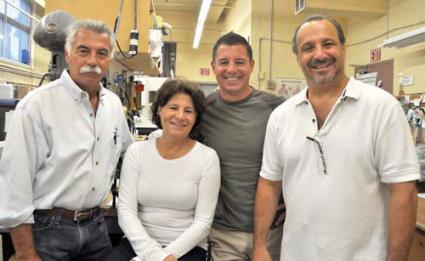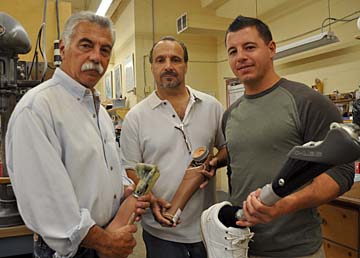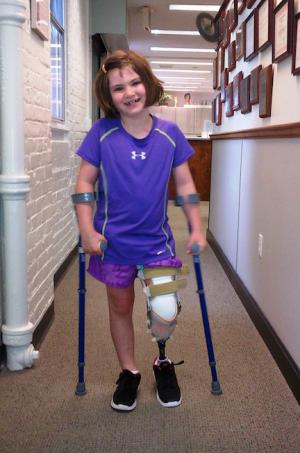September 11, 2013
 Family Business: Five members of the Martino family operate United Prosthetics, Inc. on Columbia Road: from left: Siblings Paul, Mary, Greig and Christopher Martino, who is Paul’s son and represents the fourth generation of Martinos in the business. Gary Martino, who is not shown, runs the company’s production department. Photo by Bill Forry
Family Business: Five members of the Martino family operate United Prosthetics, Inc. on Columbia Road: from left: Siblings Paul, Mary, Greig and Christopher Martino, who is Paul’s son and represents the fourth generation of Martinos in the business. Gary Martino, who is not shown, runs the company’s production department. Photo by Bill Forry
Hope can be elusive. Sometimes it’s never found.
And sometimes it’s there waiting, just around the corner, in a converted fuel company warehouse in Dorchester.
For thousands of people living in New England, the ingredients to a richer, more satisfying life can be found behind the doors of United Prosthetics, Inc. – a family-owned business that will celebrate its 100th birthday next year.
One of the nation’s leading fabricators and fitters of artifical limbs— United Prosthetics makes its home in a tidy, two-story brick warehouse that is nestled between the commuter rail tracks and a stretch of Columbia Road between Uphams Corner and Grove Hall.
There are many places amputees could go to get an artificial limb, but thousands of people come to this Dorchester address each year to find what they can’t get anywhere else: the latest in customized prosthetic technology, delivered with personalized, old-fashioned care. It helps that the United team is led by five members of the Martino family, which can now point to four generations of expertise stretching back nearly a century.
Philip Martino, an Italian shoemaker who settled in Mattapan, incorporated the company back in 1914 and employed amputees – many of them veterans of the First World War – as salesmen. He set up shop in old Scollay Square downtown until he was forced to move as the wrecking ball destroyed that legendary neighborhood. Philip’s son Joseph joined the business after returning from a heroic stint as a ball-turret gunner in World War II. He didn’t intend to stay long, but after his father’s sudden death in 1952, he took charge and modernized United Prosthetics, then located on Berkeley Street, establishing new partnerships with the region’s leading hospitals and nursing homes.
In 1974, the company was forced to relocate for a third a time under difficult circumstances. The Boston Redevelopment Authority seized its workshop and offices by eminent domain – supposedly to aid the growth of a local school. The family resisted, but when the inevitable happened, Joe Martino found an old fuel company building on Columbia Road to accommodate his still-growing business.
Joe died in 2000 after a brief illness. In fact, he was still working until a few days before his death. But he left the family business in the very capable hands of four of his children: Paul, Mary, Greig, and Gary Martino. All of them grew up in the business and learned the trade from their dad. Today, the four siblings have been joined by Chris Martino, Paul’s son, who works as the company’s marketing and sales manager.
 High-tech products with an old-fashioned approach to caring for patients: Paul, Greig and Chris Martino. Photo by Bill ForryEach Martino has a speciality, which helps explain why they’ve worked so well together for so many years. Gary runs the production department on the second floor and keeps a team of employees busy assembling limbs and sculpting special orders. Mary keeps the books and runs the front office. Joe and Greig, each a certified prosthetist, keep up with a steady stream of patients who come in daily to be fitted for new limbs or to make adjustments to their existing equipment— including state-of-the-art artificial hands.
High-tech products with an old-fashioned approach to caring for patients: Paul, Greig and Chris Martino. Photo by Bill ForryEach Martino has a speciality, which helps explain why they’ve worked so well together for so many years. Gary runs the production department on the second floor and keeps a team of employees busy assembling limbs and sculpting special orders. Mary keeps the books and runs the front office. Joe and Greig, each a certified prosthetist, keep up with a steady stream of patients who come in daily to be fitted for new limbs or to make adjustments to their existing equipment— including state-of-the-art artificial hands.
“We’re old-fashioned, but not on technology,” says Greig, who often travels to manufacturing companies elsewhere in the country to help them develop and test new products. “We’re old-fashioned in the way we treat our patients. When it comes to technology, we’re second to none.”
It’s that combined reputation for excellence and family-friendly care that resulted in so many victims of April’s Marathon bombings coming to the Martinos’ doors.
One of them was Jane Richard, the seven-year-old Dorchester girl who lost her leg— and much more— in the terror attack. Her brother, Martin, age 8, was killed in the blast outside the Forum restaurant and her dad, Bill, and mom, Denise, were both injured.
“During our time at Spaulding [Rehabilitation Center], Jane’s doctors mentioned several prosthetic providers, including a company right in Dorchester,” explains Bill Richard. “We had never heard of United Prosthetics but we were interested in meeting with them, especially since they are just a few miles from our house. Soon we brought Jane in to meet Paul Martino.
"They hit it off, which was an important consideration for us. Paul and the rest of the staff made things very comfortable for us, maybe unknowingly, but just meeting the other members of the family and listening as they cracked jokes about each other made us feel at home.”
 Jane Richard: Dorchester girl, 7, tried out her new prosthetic leg at the United headquarters on Columbia Rd. Photo courtesy Richard familyOn the four-month anniversary of the bombing, the Richard family released a statement and a photo that showed Jane trying out her new prosthetic leg in the hallway at United Prosthetic. The limb is a below-knee prosthesis that is a hybrid of new and old technology— a thigh lacer and joints— that many companies no longer use.
Jane Richard: Dorchester girl, 7, tried out her new prosthetic leg at the United headquarters on Columbia Rd. Photo courtesy Richard familyOn the four-month anniversary of the bombing, the Richard family released a statement and a photo that showed Jane trying out her new prosthetic leg in the hallway at United Prosthetic. The limb is a below-knee prosthesis that is a hybrid of new and old technology— a thigh lacer and joints— that many companies no longer use.
In the statement, Bill and Denise Richard noted that “while she is getting more comfortable with it, she is also limited with how much she can wear it at any one time. When she is able to have it on, she struts around on it with great pride and a total sense of accomplishment. Her strength, balance, and comfort with the leg improve every day.”
There’s no question that the convenience of having United Prosthetics right in their backyard is a huge help to the Richard family and to Jane’s recovery. But like most patients, it’s the quality of the product and care that keeps them coming back— some of them for a very long time.
Tony Anaki, a retired restaurateur from Bridgewater, has been receiving care from the Martino family since age six when he lost his right leg below the knee after getting stuck in a railroad turntable. Today, at age 88, Anaki still drives from Bridgewater to meet with the Martinos— either at their Dorchester headquarters or at his physician’s office at a local hospital.
“I’ve gone through three generations – from the grandfather when their offices were in Scollay Square,” said Anaki. “Things have changed, the legs have changed. We used to call them wooden legs. It was literally a wooden leg. Today, I call it a corkscrew. It is made and fitted with the modern technology they have and the foot can go sideways.”
Anaki can relate, in part, to the uncertainty and fear that Jane Richard and her family are facing in the wake of her horrific injury. He went through the multiple surgeries that were necessary to fit an artificial leg on his knee until he stopped growing. “Modern technology is on her side, at least,” said Anaki, who added that the caring nature of the Martino family is another asset that the Richard family can count on.
“Anytime you need to speak to one of the family, you will get one of them. They are very, very close. Their father [Joseph], he was the nicest man, the finest. He made you feel like you could do anything— skiing, play baseball. When he passed away, I cried.”
David McCracken, a 57-year-old retired Verizon worker, lost his leg to bone cancer at age 13. He spends some of his free time counseling new amputees at Spaulding Rehabilitation Hospital in Charlestown and also comes in to help the Martinos by talking with some of their patients at the United headquarters.
The Martinos are special, David says, because they provide a level of one-on-one attention that other companies can’t top. For instance, Greig Martino actually flew out to Idaho with McCracken a few years ago to meet with the manufacturers of his latest limb – a state-of-the-art C-leg, which is short for computer-leg. It comes with a built in microprocessor that instantly reads McCracken’s movements and gives him far better mobility. It can be plugged into his laptop to analyze and tweak its performance.
“Greig went out there to take a class on the C-leg and he took me with him as a patient,” says McCracken. “Technology has advanced so much since I was 13. I can do a lot of things myself at home because the equipment is so much better.”
But there are many day-to-day issues that still require the expertise of the Martino family. “The thing I love about United Prosthetics is I can tell them what the problem is and they don’t quit until that problem is resolved,” McCracken said, adding with a laugh: “And I was not always the easiest patient to work with.”
When McCracken discovered a passion for horseback riding, he turned to United to retrofit one of his limbs for the saddle. Another time, he asked them to fashion a new leg that would allow him to run. And when he found that his insurance company wouldn’t pay for the new C-leg that has aided him immensely in recent years, Greig Martino connected him with a foundation that helped pay for the bulk of the cost. “Greig was always a big help. That’s the type of person I need to help me stay mobile and keep me moving forward,” said McCracken.
Bill Richard is grateful that the Martinos and United Prosthetics will be there for his daughter as well.
“The location is certainly convenient for us, especially in the early months when several visits each week are not uncommon. But we would drive 100 miles each way if we thought there was a better place for Jane. But right now that place is here, a local company with 100 years of experience, who clearly know their craft and are just good people.”


